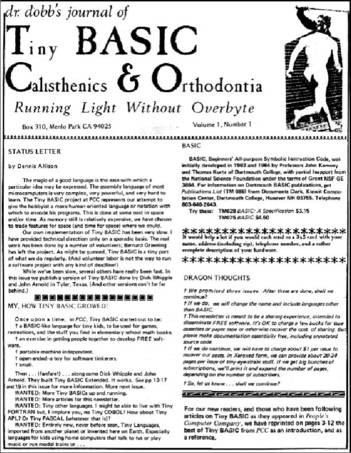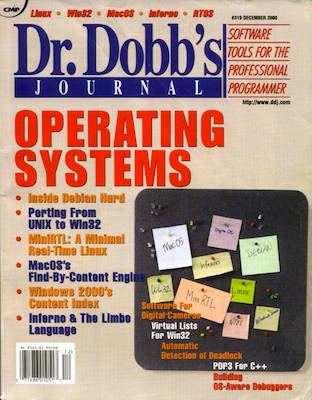| Dr Dobb's Bites The Dust After 38 Years |
| Written by Mike James | |||
| Wednesday, 17 December 2014 | |||
|
If you don't know Dr Dobb's - or Dr. Dobb's Journal of Computer Calisthenics and Orthodontia - then you probably missed out on a great era of computing. Sadly this iconic publication has just announced that it is closing and the reasons are worth exploring. Dr. Dobb's Journal of Computer Calisthenics and Orthodontia was a revelation back in 1975 and yes this was its full and correct name and it had "Running Light Without OverByte" just below the title. It was a deeply technical magazine and didn't shy away from publishing listings of complete interpreters - Tiny Basic for example. It was part of the revolution and many a programmer from that era learned a lot from the good doctor. Contributors include legends like Steve Wozniak, Jef Raskin, Gary Kildall and more. It was an enthusiast's magazine that majored on programming and software.
Dr Dobb's First Issue
The great days soon started to fade and Dr Dobb's morphed into something else - a few something elses over the time. If you were new to programming after about 1980 you might well have missed Dr Dobb's, but those who grew up with it still revered it and tried to get others in on the secret. Slowly Dr Dobb's retreated to become a web site that encouraged you to sign up with a PDF magazine. Now its editor, Andrew Binstock, has announded that even the web site will end with 2014. So Dr Dobb's joins the ranks of Byte, .EXE, Program Now and VSJ. The question is why? The stated reason is falling ad revenue, but this is just a reflection of the fact that it isn't easy to make any sort of profit on a web-based magazine. Given I Programmer is a web-based magazine we know better than most what the struggle is all about. There are a number of myths that need to be put to rest. The first is that hosting is cheap, next to free. It is as long as the site has virtually no traffic. As soon as the traffic increases you have to move to something that costs money - a lot of money. The second is that advertising is ridiculously profitable. It isn't. Google, and similar ad agencies, make a lot of money on web advertising - but they do it by selling huge quantities of ad impressions on other people's web sites. They don't pay for the content creation and so can afford to sell as cheap as they have to. The websites Google relies on do have to pay for content creation and hosting, but can't set a minimum price because they simply wouldn't get any ads because other sites with lesser content would be cheaper.
Glossy magazines charge glossy prices for advertising
A paper print magazine of the Dr Dobb's type might pay anything from $200 per 1000 words. A typical 1000-word news item struggles to make $5 in advertising revenue from Google, say. Put simply, the economics just don't add up and then you have to throw into the equation ad blocker and a general resistance to contributing even to the costs of serving content - how often has "why should I pay for bandwidth to download your ads" been used as a justification for blocking them without a thought to the cost incurred by the website in hosting and serving the content. It is a very one-sided relationship and it has only been possible because advertising provided at least a promise of paying for the service. The web is a very hostile place for anyone with the idea that they might encourage professional technical writing by paying for it rather than just expecting it to be given for free. Dr Dobb's is a victim of this impossible environment. What we were once willing to buy on paper, we expect to be given away on web pages.
More InformationRelated ArticlesThe H Closes Due To Lack Of Revenue Adblocking - Looking For A Solution Rationality, advertising and profit
To be informed about new articles on I Programmer, install the I Programmer Toolbar, subscribe to the RSS feed, follow us on, Twitter, Facebook, Google+ or Linkedin, or sign up for our weekly newsletter.
Comments
or email your comment to: comments@i-programmer.info |
|||
| Last Updated ( Wednesday, 17 December 2014 ) |



